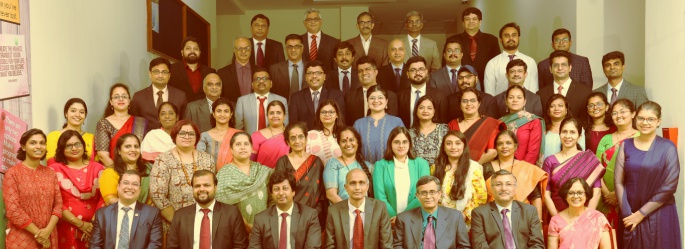Full-time MBA or part-time? Experts explain difference between the two
Publication: The India Express
Author: Prof. Jeevan J Arakal
It’s been over a decade since online MBA courses were introduced in the Indian market. During Covid, most online platforms registered a massive increase in applications from both freshers and professionals. Indians are upskilling themselves to be able to survive in the competitive job market. Apart from many top business schools such as IIMs, XLRI Jamshedpur, the Indian Institute of Technology (IITs) have also started offering MBA programmes now.
However, is the part-time or online MBA better than the full-time MBA programmes offered by several universities and institutions across the country, is a big question that aspirants often struggle with these days.
Earn while you learn
Experts believe that while part-time MBA can help candidates pursue the degree while making sure they can earn by the side, these courses are fit for people who have no other choice. “MBA, by its nature, is an experiential programme that involves interactions with peers, professors, industry practitioners, and society. A full-time MBA is better suited for candidates, as in-person learning has a more significant impact. The learners become part of a supportive learning community, with an exciting mix of colleagues and professionals from diverse backgrounds,” said Avinash Kumar from Ajeenkya D Y Patil University (ADYPU) Nuovos.
On the other hand, the online MBA programmes, “which leverages technology and other tools to replicate the high-intensity atmosphere of a full-time MBA is a worthwhile investment for programme participants, especially for those who have successful corporate careers,” explained Prof Jeevan J Arakal from TA Pai Management Institute.
Part-time courses are ideal for candidates who are working and have several years of experience, especially since the majority of the online/part-time programmes do not offer placement opportunities like the full-time courses. “Without a doubt, I would personally recommend candidates to pursue offline MBA programmes. Online programmes are for people who, for whatever reason, cannot afford to quit their jobs or have responsibilities for which they need flexible hours and they cannot commit to a full-time programme. Only in these cases I would recommend online programmes,” Himanshu Rai, director of Indian Institute of Management, Indore told indianexpress.com
Agreeing with Professor Rai, Arakal added, “At a reputed Indian management institute, campus placements are an integral part of the programmes. I am sure most of us would have seen announcements of 100 per cent placements from many top institutions. This is in sharp contrast to global peers who provide career advancement support; however, they do not coordinate campus placements like the Indian institutions. Job prospects are a function of the candidate profile, economic environment, and institute reputation. If one looks at part-time/ online programmes there are very few programs that offer placement opportunities, however, several provide career support in -terms of arranging job interviews.”
Is there any difference in programme structure?
When it comes to course and programme structure, candidates do not have to worry about missing any important concept as the programme structure is almost the same for online/part-time and offline MBA programmes. “We cannot miss any concept just because of the medium of the programme. If we have to teach students about negotiations, then it has to be taught and cannot be missed in online or offline programmes. So, the curriculum and programme structure remains the same,” Rai explains.
However, he adds that what changes, though, is the way of teaching those important concepts. For example, “I use one-on-one cases for negotiations in offline class, but when it comes to online programmes, I may not be able to do the same. In such cases, I can take help of some alternate software or simulations to ensure that candidates still get those exercises and concepts,” he explained. He also added that teachers will have to come up with alternatives of such project works or offline exercises to ensure that no candidate misses out on the important exercises related to concepts that will help them in their real-world version of the jobs.
Lack of field work
Another important activity that online programme candidates may miss out on are projects or internships. “Fieldwork and internships are usually excluded in part-time MBA programs. Also, part-time courses are spread across a longer duration than full-time courses,” which could minimise the available time for internships or fieldwork, explains Kumar.
However, other than physical fieldwork/ internships and group projects, the majority of the course for both programmes is similar. So, whether to choose a full-time programme or full-time majorly depends on your sources of financing for an MBA programme, your key long-term career goals and on your current life/ career stage.
“Students who are not working currently must look at the best returns on time invested, whether it be a part-time programme or a full-time. Although a part-time programme provides them the flexibility of working in an organisation, they get limited time to devote to self-study, assignments, and research. Recruiters value a full-time program for their job openings,” Kumar said.
When asked if he thinks recruiters would prefer candidates who have completed offline MBA programmes, Professor Rai said that he believes “employers would put a premium to the offline candidates” specifically because candidates who earn their online degrees miss out on an important component of the degree, i.e. peer learning.
“When we talk about a classroom, there are three components to any education — knowledge, skills and attitude. Now you can impart knowledge and skills, how do you impart an attitude? It is very difficult because attitudes develop on their own, for example listening to your peers, or feedback to students, non-verbal feedback, living on campus, too, teaches you a lot such as organising time, becoming self-sufficient and independent,” he explained.




